Coriolanus Is Shakespeare's CrossFit Bro in the End Times
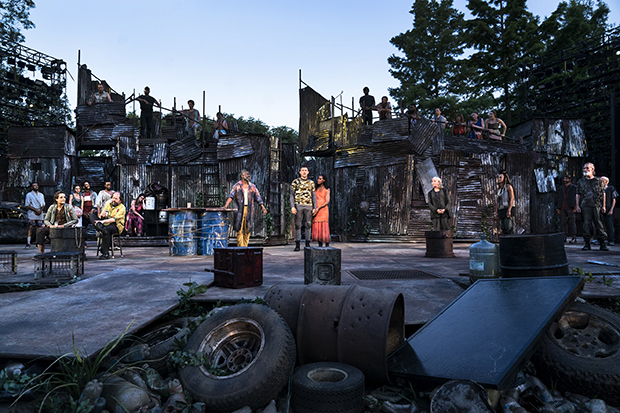
(© Joan Marcus)
As envisioned by director Daniel Sullivan in the Public Theater's Shakespeare in the Park production of Coriolanus, Rome looks like an outpost in the not-too-distant future, when water scarcity and social breakdown has forced people into fortresses of corrugated iron. Once the domain of Hollywood, such apocalyptic motifs have invaded our public discourse, like when presidential candidate Andrew Yang answered a question about climate change at a recent debate by stating, "We need to start moving our people to higher ground." If this is indeed one of the last remaining seasons at the doomed Delacorte Theater, you cannot accuse the Public Theater of squandering it: Through startling performances and arresting design, Coriolanus captures our imaginations by preying on our worst fears about our leaders and the places they are taking us.
The play opens with an angry mob demanding that the greedy patricians (those one-percenters of the Roman Republic) open their grain stores to the starving plebeians (in this version, water plays the role of grain, and is kept under lock and key). Senator Menenius Agrippa (Teagle F. Bougere) tries to calm the crowd, but warrior Caius Martius (Jonathan Cake) confronts these ungrateful takers with his disdain. Martius prides himself as a maker — specifically of war against the enemy Volscians. And when he seems to single-handedly capture the Volscian city of Corioli, he is honored with a new name: Coriolanus.
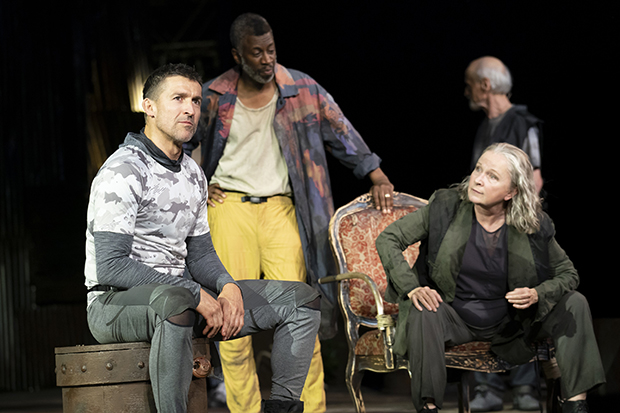
(© Joan Marcus)
His mother, Volumnia (Kate Burton), thinks this is the perfect pretext for Coriolanus to run for consul, but he expresses little interest in retail politics. If he's going to get the job, he doesn't want to be subjected to any glad-handing with the riffraff. Two tribunes, Sicinius Veletus (Jonathan Hadary) and Junius Brutus (Enid Graham), seek to provoke his temper to turn the people against him. They easily succeed, leaving Coriolanus hungry for revenge.
By setting his production in a catastrophic future, Sullivan implies that should we move to higher ground, we'll bring our classism with us. Contemptuous, obstinate, and rarely self-reflective, Coriolanus might be Shakespeare's least sympathetic protagonist. Cake offers no apologies for him in an affected and extremely unlikable performance. Forcing a mid-Atlantic lilt through gritted teeth, this childish muscle head feels like he's just strode out of a CrossFit gym to ask, Dost thou even lift, bruh?
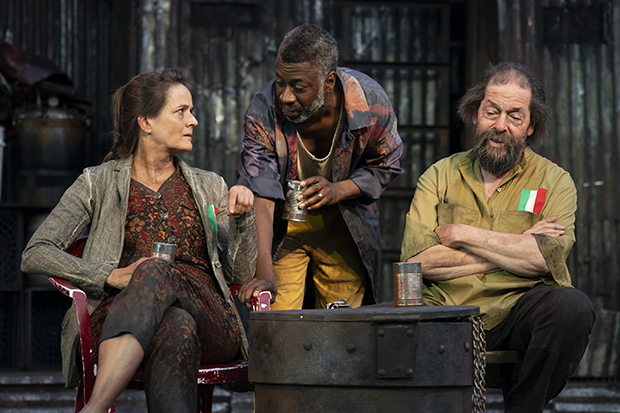
(© Joan Marcus)
In Freudian fashion, we trace his suspended adolescence directly back to his overbearing mother. So many of Coriolanus's actions are to please her, and Burton arms Volumnia with a gaze of perennial disappointment that lets him know that nothing he does will ever be good enough. She's Barbara Bush beyond Thunderdome.
That's not to say we have any affinity for the fickle plebeians and their cynical tribunes. As they conspire over drinks, Hadary and Graham remind us of Chuck Schumer and Kirsten Gillibrand, their hair and makeup artists long ago eaten by hyenas.
The only character I'd hitch my wagon to in the postapocalypse is the Volscian leader Tullus Aufidius, played with unflappable serenity by Louis Cancelmi. Even as the world crumbles, he sees potential. But like a true leader, his optimism never degenerates into delusion. As Aufidius, Cancelmi beautifully conveys the heartbreak hiding behind clear eyes.
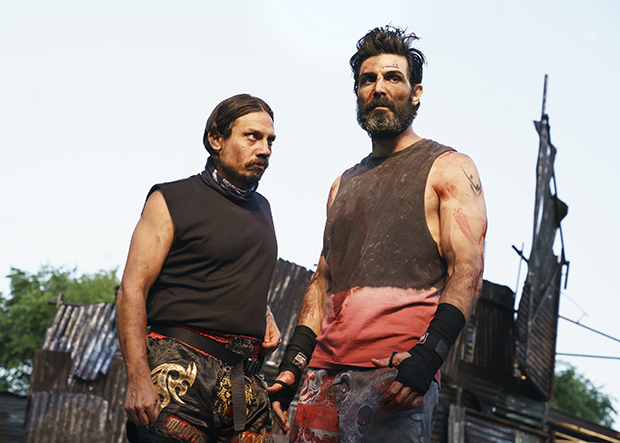
(© Joan Marcus)
Sullivan is one of the world's premier interpreters of Shakespeare, and his success comes from never neglecting the verse. He has led this cast to crisp and clear performances grounded in the text, which is timeless enough to support his fantastical design choices.
Beowulf Boritt's imposing makeshift fortress set instantly clues us into the setting of this play, while Jessica Paz's cinematic sound design tells us about the style. Japhy Weideman's lighting, which often features combatants emerging from a blinding haze, adds to this action-adventure aesthetic. As the set rotates and unfolds to create a multitude of scenes, Dan Moses Schreier's transition music keeps the hairs on the backs of our necks standing at attention. Kaye Voyce has designed realistically distressed costumes, with enough recognizable elements to tell the story of a relatively recent flight from the world we know today: These people grabbed what they could and retreated behind the walls of Rome. Activewear is prized like chain mail in this world, and rich Coriolanus seems to have access to his own Under Armoury.
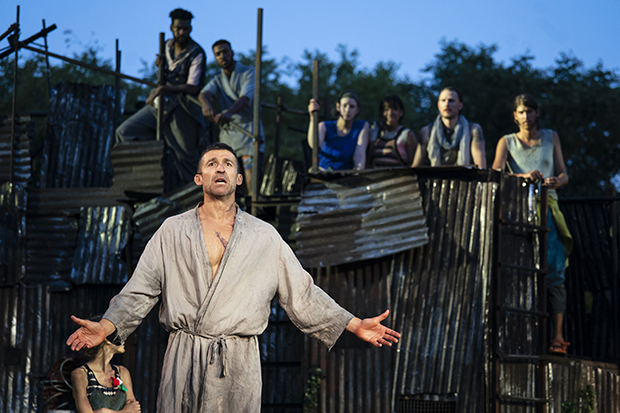
(© Joan Marcus)
Coriolanus may be an extraordinary warrior (Steve Rankin's competent, if underwhelming, stage combat shows us that), but exceptional ability in a leader is worthless without legitimacy. As our protagonist beseeches the support of Mars, we cannot help but think that he could have saved himself a lot of trouble by appealing to the people of Rome instead. That thought feels positively seditious when we consider that Coriolanus was written during the reign of James I, when the notion of the divine right of kings was ascendant. Both then and now, Coriolanus powerfully asserts that such a right is only ever expressed through the consent of the governed (who can also violently revoke it, as James's son would discover half a century later). This should be obvious to all Americans in 2019, but too many of our political leaders still don't seem to have absorbed the message.










